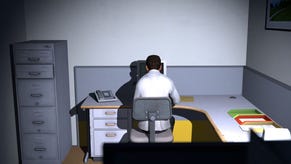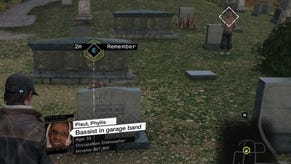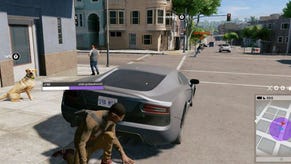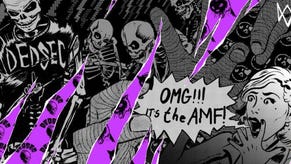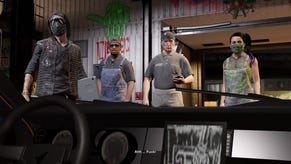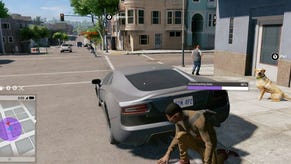Hacker's Paradise: Ubisoft On Watch Dogs
Who Watches The Watch Dogs?
Much like the news that your house is being repossessed after a particularly brutal bout of identity theft, Watch Dogs came out of nowhere. Hot on the heels of a Ubisoft press conference that could charitably be described as "at least probably not offensive to some breeds of orangutan," Watch Dogs mopped up that particular mess and then some. Main character Pearce hacked everything from cell phones to traffic lights as naturally as most of us draw breath. He stalked, he talked, and then, well, he shot some dudes. Lots of them, actually.
So Ubisoft's spilled quite a gooey glob of GTA into our Deus Ex, but is that necessarily a bad thing? Do we really need a rather large helping of lead to spice up our near-future cyberpunk intrigue? I spoke with producer Dominic Guay about that concern, Jedi hacker powers, how discovering someone's sexual history can lead to a side mission, and more. Hack your way past the break to read on. Or just click on it like a normal person.
RPS: The press conference demo ended with a zoom-out to a different character whose objective was to defend [main character] Pearce. What was happening there? Was it some form of co-op?
Dominic Guay: Yeah, it was actually me playing another character. So I was basically jumping into his adventure having my own objective, and we crossed paths physically. So we're not giving all details on what we're doing with multiplayer, but I'm totally OK with sharing our mission statement.
It's a bit presumptuous, but we feel that - in action-adventure games - the way multiplayer and single-player blend is a bit broken. You have a great adventure on one side, and then a lobby and a deathmatch and an arena on the other. We want to fix that, so we're really focused on making a consistent universe where you're focused, immersed, free to go wherever you want, and when you play with other people, you keep all of that. You keep quality, the ability to choose where you go, etc. So what you saw there was a little piece of how two players can meet and exchange goals in the game.
RPS: So you had your big spiel rooted in real world events at the beginning of the demo, but then Pearce waved his hand and took out entire phone networks and stoplight systems like some kind of magical Hollywood hacker Jedi.
Dominic Guay: It's not. It's not [like that]. So obviously, the player will build up his abilities. He won't start out being able to do everything. Obviously, for the purpose of the demo, it was kind of a late game moment. You have a lot of abilities built up. There will be a very realistic reason behind his access to the city - how he can grow his power gradually. It's going to be the player choosing where they want to put those efforts - on what type of control, how much he wants to invade the privacy of whom, and what he wants to do with that information. It'll be the player who chooses that.
And really, all the things we're doing in the game - so you saw hacking radio frequencies, hacking traffic systems, watching people through surveillance cameras - we have concrete references from the real world for all of that. Obviously, he has some pretty good back doors there, but that'll be explained in the game.
RPS: The demo opened with a big speech about the marginalization of the individual and the idea that we're all just data points now. It seemed very cautionary in nature - like, "Oh, this is clearly an impersonal, almost inhuman attack on who we are as people." Which is a bit odd, coming from, well, a giant corporate entity like Ubisoft. Is that dissonance something you've been aware of in creating Watch Dogs?
Dominic Guay: We're not putting judgment on it. We're not saying it's either bad or good. It's just what you do with it, right? Some people have asked us "Are you a good guy or a bad guy?" We're really going on the gray there. So you choose as a player what you do with that power. It's either good or bad.
We don't think technology's bad, right? We love technology. We're saying it's powerful. We're all dependent. We're putting our personal lives on cell phones. We're all dependent on the city that's run mostly through computers - traffic, communication, electricity grids - and that can become an incredibly powerful weapon in the hands of a single man.
RPS: The demo opened at a very methodical, atypical (at least, for games) pace, but ended with slow-mo shooting and cyberpunks dying very real deaths. So, is this an action game, or a game about hacking that just so happens to contain brief, powerful moments of action?
Dominic Guay: It's definitely going to be an action-adventure game at the heart of things. Every player is going to play differently. It's an open world, and every mission objective has different ways of pulling it off. You saw how he got into the [art show] center by doing something very subtle - hacking the system. He could've also stealthed in through a back door or barged in through the front. So some players may want to play very violently, and some others might want subtlety and control. Obviously, we're going to give you options to use all of those things, and you as the player - depending on your type of approach - are going to be able to mix that up.
RPS: Is that, in some ways, to your disadvantage, though? I feel like the hacking mechanic - given proper attention and nourishment - could stand alone and really evolve into something special.
Dominic Guay: Well, the reality of things is that we want to give the player a lot of power. So we want Pearce's actions to have impact. As you saw in the demo, you start a firefight in the middle of downtown - you hack a traffic light to make everyone crash - there's collateral damage. A woman got killed. And then we choose to save a bystander there amidst the collateral damage. Do I want to do those things? Do I want to create those collateral damages?
Or maybe I could have taken a different approach. Maybe I could've followed the guy to the park and then taken him out much more subtly than just starting a firefight. So I think letting players express their freedom - and not just through violence, though he's definitely capable of it - and mixing it up with his ability for control, that's the sweet spot. I mean, he hacked a traffic light but ended up in a firefight. That's the sweet spot we're aiming for.
RPS: Everybody's hackable, and during the demo, you briefly mentioned "side opportunities" that could arise from successful hacks. What sorts, though? I mean, I saw that someone was HIV positive. Can you provide examples of how that kind of thing leads to missions?
Dominic Guay: Obviously, you saw one specific example during the demo. You saw how we hacked into a conversation to find out that someone was coming. But another example... you might have noticed that one person was guilty of plagiarism. So maybe you can follow that person home, hack into his personal laptop, and actually find out that he's doing it again, and blackmail him for money.
Another example is maybe you can find a guy's bank account number. So maybe you decide you want to start slowly stealing from that bank account. With so much information available on computers now, we're trying to support as many types of both honorable and dishonorable uses of information as you want.
RPS: So what's Pearce actually trying to accomplish with all of this?
Dominic Guay: That's something we're keeping under wraps for now. He's fighting a corrupted system. But it's a pretty large system. He's been hurt. People close to him have been hurt. So he's definitely upset. The guy's totally obsessed with power and control, and he's trying to fight a corrupted system. But, you know, the answers for that will be in the game.
RPS: And the demo was running on PC?
Dominic Guay: Yeah, we're running on PC at E3.
RPS: Good. Then all is as it should be. Otherwise, I wouldn't have felt right about thanking you for your time.





